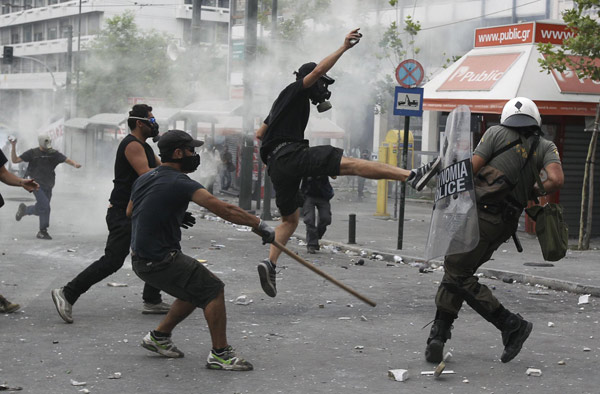Global General
Greece passes steep cuts as riots seize capital
(Agencies)
Updated: 2011-06-30 06:27
 |
Large Medium Small |
ATHENS, Greece - Greece fended off a bankruptcy that threatened to roil global financial markets, approving severe spending cuts and tax increases Wednesday in the face of violent protests by Greeks who say they have suffered enough.
The package of austerity measures would keep bailout money flowing to Greece from the rest of the world. It would free $17 billion in fresh loans, although the money will only be enough to see the nation through September.
Investors around the world cheered the news, but protesters, fighting tear gas, hurled whatever they could find at riot police and tried to blockade the Parliament building.
"This is bad. The country will be sold for a piece of bread," said insurer Dimitris Kostopoulos. "There were many other more appropriate alternatives to this. Parliament has once again betrayed us."
Public sector salaries and pensions have been cut in the past year, and unemployment is above 16 percent. By comparison, it is about 9 percent in the United States.
Parliament approved $40 billion in tax increases and spending cuts, and privatization of public services to raise $71 billion more, all through 2015. Greece's overall economic output is about $330 billion, or roughly the size of Washington state's.
The $17 billion in loans are the latest batch in a $157 billion bailout by the European Union and the International Monetary Fund. Parliament is expected to pass another bill Thursday to implement the austerity measures.
Without the bailout money, Greece was at risk of default. While no one knows for sure what would have happened next, analysts have said it would have threatened the viability of the euro, the European Union's common currency, and could have done much worse.
Some market experts had predicted a Greek default could have trigged another world financial meltdown, like what happened after the Lehman Brothers investment house collapsed in 2008 in the United States.
The risk is that banks, both in Europe and the US, would have had to chalk up billions of dollars in losses because of Greek loans that had gone bad. No one knows which US banks hold what amount of Greek debt.
On Sunday, European finance ministers will meet in Brussels to work on a second bailout for Greece, expected to be similar in size to the first, in hopes of shoring up its finances beyond just a few months.
Banks are expected to share some of the burden. One way would be for banks to repurchase Greek bonds after they expire, as French banks have indicated they may do. Many economists still expect it won't be enough.
"We must avoid the country's collapse with every effort," Prime Minister George Papandreou said before the vote. "Outside, many are protesting. Some are truly suffering. Others are losing their privileges. It is their democratic right. But they and no one else must never suffer the consequences ... of a collapse."
More protests could undermine the government's ability to implement the harsh austerity measures, which tax even the lowest-paid Greeks and raise prices during a recession.
"They are not out of the water just yet," said Carl Campus, an analyst at BMO Capital Markets.
| 分享按钮 |
